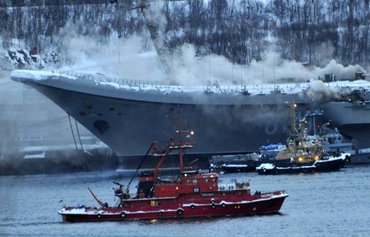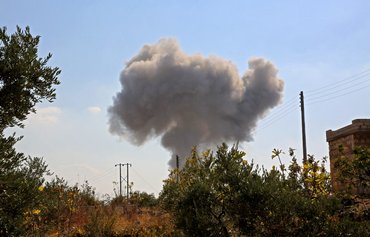MOSCOW -- Global concerns over safety, efficacy and nuclear capability are undermining Russia's attempts to sell its weapons to clients worldwide.
These concerns centre around the credibility of the Russian regime's preening over these weapons systems.
At a parade of warships in Saint Petersburg on July 25, for example, Russian President Vladimir Putin said Russia had secured its place among the world's leading naval powers, including by developing "the latest hypersonic precision weapons still unrivalled in the world".
"We can detect any underwater, surface or aerial enemy and target it if a lethal strike is necessary," he said according to a broadcast on state television.
![A major fire broke out on Russia's only aircraft carrier, the Admiral Kuznetsov, in December 2019, highlighting growing concerns about the country's aging military hardware. [Lev Fedoseyev/TASS]](/cnmi_di/images/2021/08/09/31113-aircraft-600_384.jpg)
A major fire broke out on Russia's only aircraft carrier, the Admiral Kuznetsov, in December 2019, highlighting growing concerns about the country's aging military hardware. [Lev Fedoseyev/TASS]
![This screenshot of a YouTube video shows the aftermath of an accident in August 2019 in Arkhangelsk Province, Russia. The disaster occurred during a test of a nuclear-powered missile, resulting in the death of five staff members and releasing elevated radiation levels. [File]](/cnmi_di/images/2021/08/09/31114-pak2-600_384.jpg)
This screenshot of a YouTube video shows the aftermath of an accident in August 2019 in Arkhangelsk Province, Russia. The disaster occurred during a test of a nuclear-powered missile, resulting in the death of five staff members and releasing elevated radiation levels. [File]
The boast came days after military officials announced tests of advanced new weapons, some of which come from the arsenal Putin described as "invincible" in 2018.
'A great event'
The Kremlin's bellicose rhetoric and trumpeting of high-sounding achievements continue.
In mid-July, the Defence Ministry boasted about its "successful" test of the Zircon anti-ship hypersonic cruise missile.
Footage distributed by the ministry showed the Admiral Gorshkov warship launching the cruise missile at a Barents Sea coastal target in northern Russia.
"The Zircon missile ... achieved a direct hit at a range of over 350km," the ministry said July 19. "The flight speed reached about Mach 7."
The Defence Ministry has said it plans to equip both warships and submarines with the Zircon.
The missile has undergone several recent tests, and last October Putin described one of the test firings as a "great event not just in the life of our armed forces but for all of Russia".
He sounded the same in 2018 after testing the hypersonic Avangard missile.
"This is a major event in the life of the Armed Forces and probably of the country," he told the cabinet December 26, 2018.
A day earlier, the Kremlin announced it had begun testing the Poseidon underwater nuclear weapon, which Putin has described as being "invulnerable" to enemy defences.
The Russian government and Kremlin media made plentiful claims of both the Poseidon and the Avangard's destructive power, although so far they have not backed up those assertions.
Defence analysts and observers have ridiculed those assertions as far-fetched and politically motivated.
Checkmate: you get what you pay for
In similar dramatic fashion, a day after the Kremlin announced the Zircon tests, Russia unveiled its new Sukhoi stealth fighter jet, dubbed "Checkmate".
Few details had previously emerged about the plane, developed by defence contractor Rostec and the state-controlled United Aircraft Corporation (UAC), but the manufacturers were quick to make unfounded claims.
The jet can attack up to six targets simultaneously on land, air or sea, "even under strong electronic interference", they said.
UAC general director Yury Slyusar said he expected nearly 300 orders in the next 15 years mainly from the Middle East, Asia and Latin America.
The strongest selling point appears to be the price.
The price of Checkmate is "seven times lower" than that of the American-made US F-35, emphasised Slyusar.
While the Russian jet may be less expensive than the versatile and proven US stealth fighter aircraft, the Kremlin's penchant for exaggeration -- and Russia's history of deadly military mishaps -- raises questions about the quality of Russian materiel.
Weapon failures at home and abroad
Below are only a few examples of recent embarrassing mishaps.
Last December, the Kremlin sounded the alarm over the theft of sensitive equipment from a "doomsday plane" designed to shield top command from the effects of a nuclear explosion.
In the six-week war last fall pitting Azerbaijan against its breakaway Nagorno-Karabakh (NK) region and Armenia, Russian military hardware was on full display.
NK, populated almost entirely by ethnic Armenians and supported by neighbouring Armenia, depended on Russian air defences, while Azerbaijan unleashed a swarm of Turkish and Israeli drones.
The troops from NK and Armenia suffered crushing defeats -- just as pro-Russian Libyan militants and Syrian government forces were let down by their Russian weapons earlier last year, as reported by Radio Free Europe/Radio Liberty and other media.
On November 9 the world saw a precision strike by Azerbaijan destroy a crown jewel of the Russian military-industrial complex: the Tor-M2KM anti-aircraft missile system.
"Judging from the [Azerbaijani] video that was posted, even when it was practically at point-blank range, the Tor-M2KM anti-aircraft missile system did not detect the targets it was designed to fight," one analyst told Avia.pro, a Moscow-based news agency that covers military topics, last year.
In December 2019, Russia's only aircraft carrier, the Admiral Kuznetsov, caught fire in Murmansk while more than 400 people were on board. The blaze spread over an area of about 600 sq. metres.
In August 2019, an explosion ripped through the Russian military's main nuclear-research site in Arkhangelsk province while personnel were attempting to develop new weapons.
Western analysts linked the blast to the Burevestnik missile, one of the so-called "invincible" weapons revealed by Putin in 2018.
The nearby city of Severodvinsk recorded elevated radiation levels following the accident, and panicked residents rushed to buy iodine.
In July 2019, 14 Russian sailors died from inhaling toxic fumes from a fire on a deep submersible -- a tragedy that echoed the sinking of the Kursk submarine in 2000, which took the lives of 118 personnel and shook the first year of Putin's presidency.
Aging Russian equipment has also been in the news.
The crash of a Russian-built Mi-8 helicopter in Kazakhstan in March 2019, which killed all 13 troops on board, is one such example.
Kazakh President Kassym-Jomart Tokayev ordered an investigation into the accident-prone Mi-8. In August 2018, another Mi-8 crash in Siberia took 18 lives.

![Russian Prime Minister Mikhail Mishustin (front) visits the Komsomolsk-on-Amur Aircraft Plant, which manufactures Sukhoi aircraft, in Komsomolsk-on-Amur on July 28. [Dmitry Astakhov/Sputnik/AFP]](/cnmi_di/images/2021/08/09/31112-000_9gx4cg__1_-600_384.jpg)






